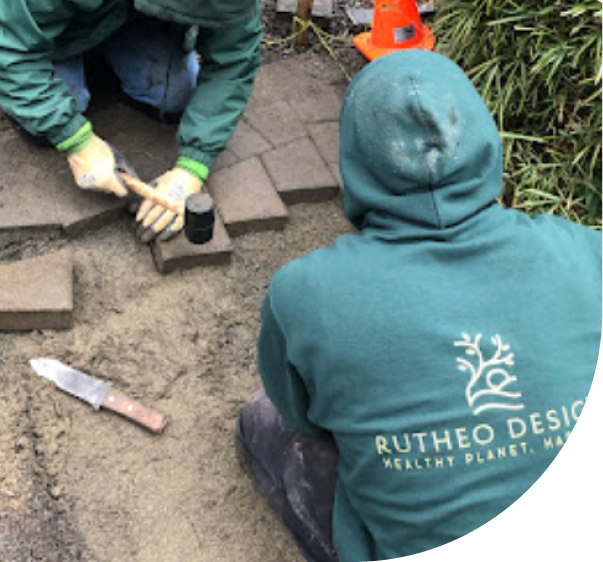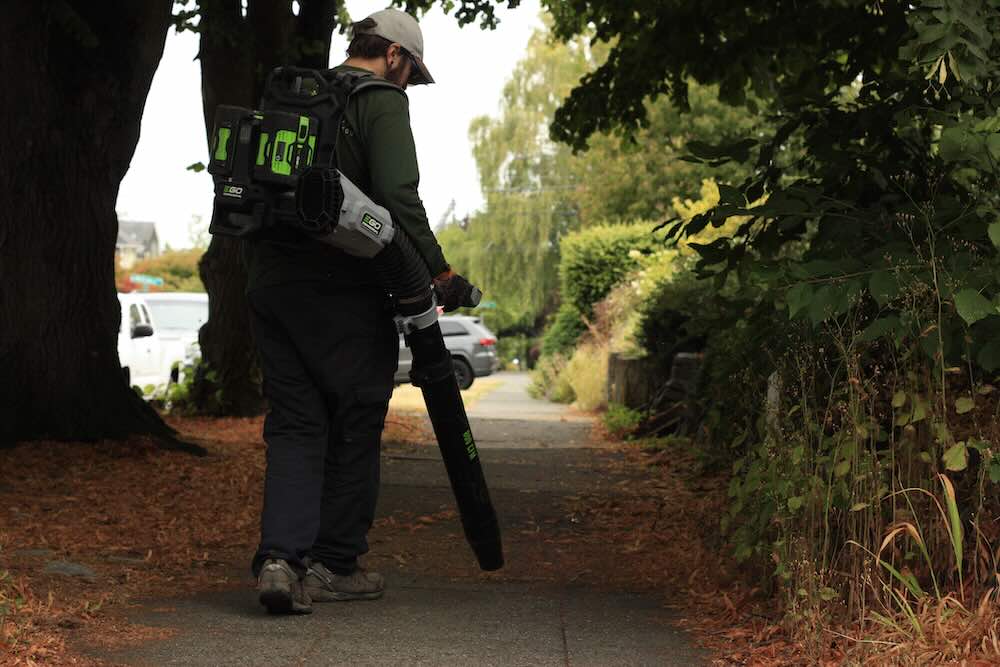
At Rutheo Designs, we recognize that every season in the Seattle area brings unique challenges and opportunities for sustainable landscaping. Spring is the perfect time to prepare your outdoor space for growth, with soil enrichment, planting pollinator-friendly gardens, and addressing winter damage. Summer, with its drier conditions, focuses on optimizing irrigation, maintaining heat-resistant plants, and creating functional outdoor spaces for relaxing or entertaining. As fall approaches, we help transition your landscape with tasks like planting seasonal vegetables, managing fallen leaves through composting, and preparing soil for overwintering. Winter, though often overlooked, is critical for storm damage prevention, frost protection, and habitat support for local wildlife. Each season demands thoughtful, eco-friendly approaches to ensure your landscape remains healthy, beautiful, and sustainable year-round.
Spring is the season to rejuvenate your landscape’s foundation. Amending soil with organic compost provides essential nutrients for new growth, while aerating compacted soil improves drainage and encourages robust root systems. Testing soil pH and nutrient levels ensures plants receive the optimal conditions to thrive. These steps establish a healthy, fertile base for spring planting, setting the stage for a vibrant landscape throughout the year.
Spring is ideal for incorporating seasonal and native plants into your garden. Native species not only adapt well to Seattle’s climate but also support local pollinators. We design pollinator-friendly flower beds that attract bees and butterflies, creating dynamic, colorful gardens. Edible gardens featuring spring vegetables and herbs, such as kale, spinach, and parsley, provide functionality alongside aesthetic appeal, allowing your landscape to serve both ecological and practical purposes.
Spring growth often brings an influx of weeds and pests, which we address using eco-friendly solutions. Removing winter weeds prevents them from competing with desired plants, while applying organic mulches suppresses future weed growth and enriches the soil. We introduce beneficial insects like ladybugs and predatory beetles to naturally manage pests, avoiding synthetic chemicals that could harm the environment.
Spring is the time to repair and revitalize lawns and ground covers. Reseeding bare patches with native grasses restores lush, even coverage. We fertilize lawns with eco-friendly products that nourish the soil while reducing environmental impact. For areas prone to erosion, establishing low-maintenance ground covers not only stabilizes the soil but also reduces long-term maintenance demands.
As Seattle enters its drier months, efficient water management becomes critical. Inspecting and repairing irrigation systems ensures they operate at peak efficiency, preventing waste and uneven watering. Drip irrigation systems are particularly effective, delivering targeted hydration directly to plant roots. Adjusting watering schedules to suit summer conditions helps conserve water without sacrificing plant health.
Summer heat requires thoughtful strategies to keep landscapes thriving. Mulching around plants helps retain soil moisture and reduces evaporation, protecting roots from extreme heat. We incorporate shade plants in exposed areas to create microclimates that shield more delicate species. Additionally, selecting drought-tolerant native plants minimizes water consumption while ensuring the landscape remains vibrant and resilient.
Summer-specific pests, such as aphids and spider mites, can quickly damage plants if left unchecked. Regular monitoring allows us to apply organic pest deterrents as needed, addressing problems before they escalate. Fungal diseases, often triggered by summer humidity, are managed through proper plant spacing and pruning, ensuring good airflow and reducing moisture accumulation around foliage.
Summer is the perfect time to enhance the usability of your outdoor space. We design and maintain sustainable patios using permeable paving, which not only provides functional beauty but also reduces water runoff. Outdoor seating areas are integrated with native and heat-tolerant landscaping, blending functionality with natural aesthetics. For additional comfort, we create shade solutions through strategic tree placement, ensuring your outdoor spaces remain enjoyable even on the hottest days.
Fall is an essential time for preparing your landscape for the colder months ahead. Planting fall vegetables such as kale and broccoli ensures your garden remains productive, while bulbs like tulips and daffodils prepare for a vibrant spring display. Adding native shrubs not only provides fall color but also enhances winter interest, creating a dynamic landscape even during the dormant season. Preparing garden beds with protective mulch layers shields soil from erosion and temperature extremes, ensuring they remain fertile and ready for spring growth. These transitions help maintain the integrity and beauty of your outdoor spaces through the changing seasons.
Managing leaves and debris in the fall is crucial for maintaining a clean and functional landscape. Collecting fallen leaves and composting them provides a valuable resource for future soil enrichment. Alternatively, leaves can be used as mulch, creating a natural barrier against winter frost and retaining soil moisture. Clearing gutters and drainage systems prevents water pooling, protecting structures and reducing the risk of damage during Seattle’s rainy months. These steps ensure your property remains well-maintained while promoting sustainability by reusing natural materials.
Fall is the ideal season for soil and lawn rejuvenation. Aerating compacted soil enhances water absorption during heavy winter rains, reducing runoff and promoting healthy root systems. Overseeding lawns with cool-season grasses ensures they remain green and robust throughout the colder months. Applying organic fertilizers encourages root growth during dormancy, strengthening plants for the spring growing season. These practices not only prepare your lawn for winter but also set the foundation for thriving growth in the coming year.
Sustainable landscaping during the fall extends to supporting local wildlife. Building brush piles and shelters creates safe havens for overwintering animals such as birds and small mammals. Adding bird feeders and water features helps migratory species replenish their energy, while planting berry-producing shrubs provides a vital food source during the winter months. These thoughtful additions ensure your landscape contributes to the local ecosystem, even during the dormant season.
Seattle’s winter storms can wreak havoc on landscapes, making proactive storm damage prevention essential. Inspecting trees for weak branches and trimming them reduces the risk of damage during high winds or heavy snow. Clearing debris from pathways and driveways ensures safety and accessibility throughout the season. Installing protective covers for fragile plants prevents frost damage and extends their longevity, safeguarding your investment in your landscape.
Winter is a critical time to protect plants from harsh conditions. Wrapping shrubs with burlap shields them from frost while allowing airflow to prevent moisture buildup. Mulching insulates soil, preventing roots from freezing and retaining essential moisture. Pruning dormant plants encourages healthier growth in the spring, optimizing their structure for future blooms and foliage. These practices prepare your plants to endure the cold months and emerge stronger when the weather warms.
Snow and ice management should prioritize both safety and sustainability. Using eco-friendly de-icing solutions prevents damage to nearby plants and minimizes harmful runoff into local waterways. Installing rain gardens helps manage increased water runoff from melting snow, redirecting it into the ground rather than overloading drainage systems. Permeable pathways enhance drainage, reducing ice formation and creating safer walkways during winter conditions.
Even in the colder months, landscapes can provide crucial support for wildlife. Maintaining bird feeders with nutrient-rich seeds sustains local bird populations when natural food sources are scarce. Planting winter-blooming plants such as hellebores offers pollinators like hummingbirds a reliable food source. Additionally, installing shelters or nesting boxes provides essential protection for animals seeking refuge during the winter season.

At Rutheo Designs, we are dedicated to transforming your outdoor spaces into beautiful, sustainable landscapes that reflect your vision and the unique character of the Seattle area. We offer services in native plant landscaping, water-efficient irrigation, custom landscape design, and hardscaping solutions tailored to your goals and the local environment. Every project is unique, and we take the time to listen to your needs and offer personalized solutions that align with both your aspirations and Seattle’s natural surroundings.
We invite you to reach out to us to start the conversation about your landscaping needs. You can contact us by email at connect@rutheodesigns.com or give us a call at (360) 844-2989. Whether you have specific questions or are ready to schedule a consultation, we’re eager to help you bring your outdoor vision to life with the care and expertise that Rutheo Designs is known for.